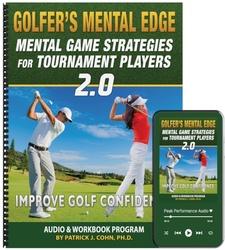
Does Slow Play Get Under Your Skin?
“For God’s sake, hit the ball already!”
There might be nothing more annoying and frustrating than playing golf against someone who takes an unreasonably long time to hit the shot.
It can be infuriating watching a golfer taking an excessive amount of time choosing their club, walking to the ball, lining up their shot, re-thinking their shot, taking many practice swings, waggling, resetting their feet, etc.
It’s not just the length of time that is bothersome; it is the negative emotions it generates for some golfers.
Watching a golfer take a long time can cause other golfers to become angry, frustrated, tense and annoyed. These negative emotions are often intense.
Intense negative emotions can override focusing on your game.
Instead of thinking about your upcoming shot, you become fixated on this annoying golfer who has become the center of your focus.
In addition, the more intense your negative emotions become, the more time it takes to regain that relaxed state needed to hit the ball smoothly and efficiently.
Basically, watching a golfer taking an excessively long time can set off a domino effect…
You get annoyed or angry watching the long drawn out play…
These emotions start bowling over as this golfer vies for your attention…
The tension in your body increases…
You find it difficult to focus on your upcoming shot due to buildup of physical and mental tension…
Your swing feels off and your shots are off line…
You become frustrated with your level of play…
And then you are back to watching this other golfer repeat his excessively long routine.
Many golfers have asked, “Is there anything I can do in this situation?”
The answer is “Yes!”
It’s a matter of controlling what you can control. “Controlling the controllables” is a valuable mental tool that can keep your emotions in check.
What Can You Control?
- Your Eyes – You don’t have to watch as a golfer takes an excessively long time. There are countless other images, including mental images that can enhance your performance.
- Your Ears – Other golfers will probably be complaining about this slow moving player. Don’t listen. Don’t allow your head to be filled with thoughts that will hurt your golf game.
- Your Mind – Your thoughts about a situation will impact your emotions and, ultimately, your play. Your mind is your most valuable asset. It is critical that you direct your focus and thoughts in a manner that is self-enhancing.
Slow play was an area of contention at the 2019 Open Championship. In the Final Round, Brooks Koepka was paired with J.B. Holmes, who is known for his slow-paced play. Koepka looked agitated at times during the round and out of rhythm with a final round of 74 after shooting 68-69-67 through the first three rounds.
When asked about the slow play of Holmes in his post-round interview, Koepka admitted to being a bit frustrated.
KOEPKA: “I just always play — I’m ready to go most of the time. That’s what I don’t understand when it’s your turn to hit, your glove is not on, then you start thinking about it, that’s where the problem lies. It’s not that he takes that long. He doesn’t do anything until his turn. That’s the frustrating part.”
Staying focused on your game, which is something you can control, gives you the opportunity to mentally prepare for your next shot.
Instead of getting angry about another golfer taking a lot of time, you can use that time to your advantage.
Use the Extra Time to Your Advantage:
Always have a plan for how you can utilize your time between shots to your advantage. Can you clear your club heads? Maybe read your notes about your mindset for the round?
You use that time to relax and let go of your last shot, create a plan for how you will play your next shot or visualize your next shot.
The goal is to stay focused on the things you can control.
Related Golf Psychology Articles
- Golfers Who are Frustrated with Slow Play
- How Dustin Johnson Reignited his Passion for Golf
- How to Optimize Pressure for Peak Golf Performance
- Subscribe to The Golf Psychology Podcast on iTunes
- Subscribe to The Golf Psychology Podcast on Spotify
Golfer’s Mental Edge 2.0

Do you suffer from fragile self-confidence after missed hitting shots or making mistakes, playing with strict or high expectations that undermine confidence, or the inability to play freely and relaxed on the course?
Successful golfers have learned how to perform with ultimate confidence in competition, so we’ve developed The Golfer’s Mental Edge 2.0 Workbook and Audio program to help you do this!
The Golfer’s Mental Edge 2.0 program includes the top 11 mental training sessions I do with my personal students to help them boost their mental game and improve consistency on the course!